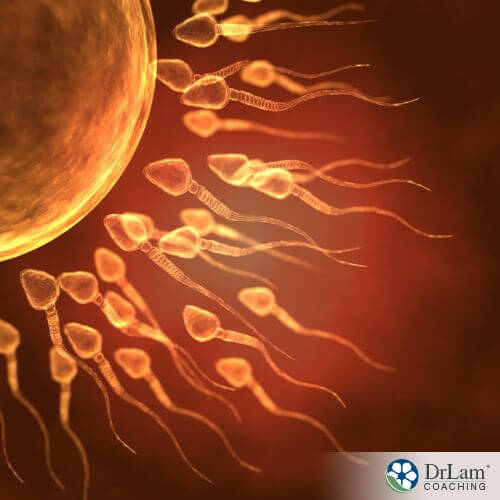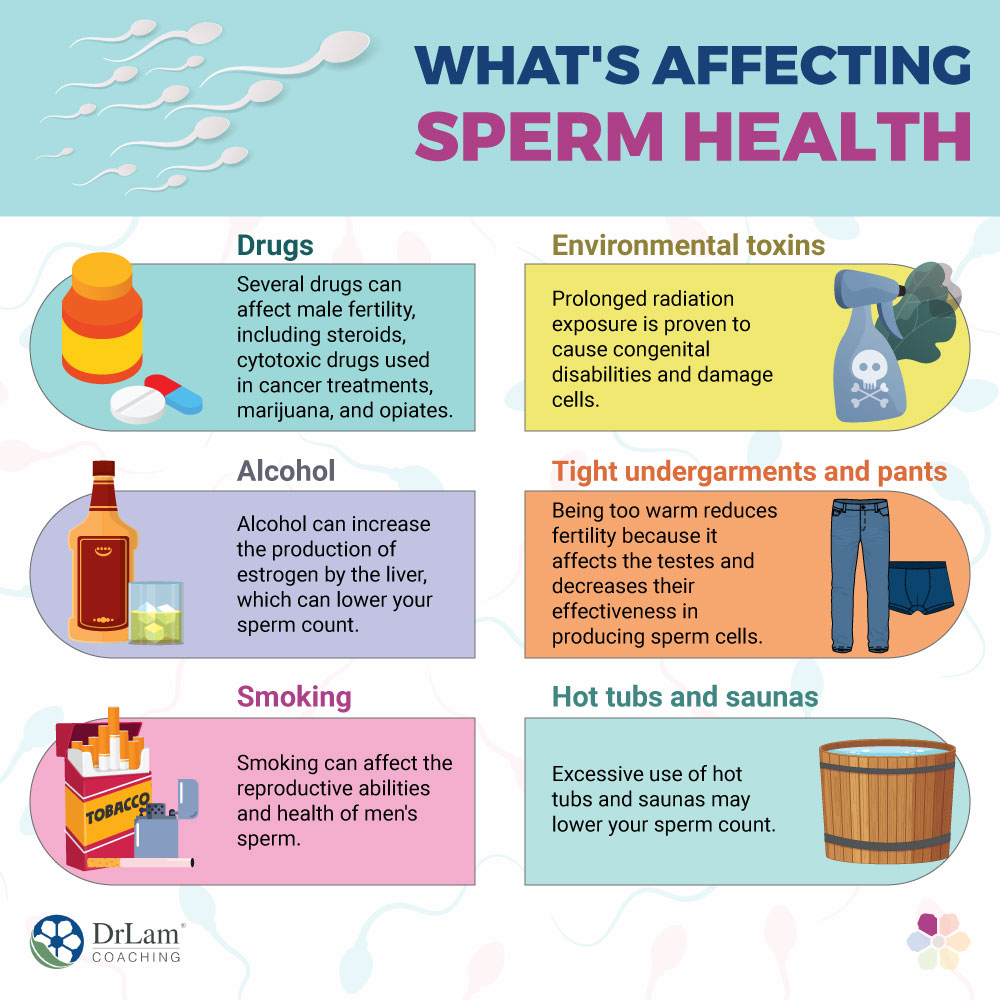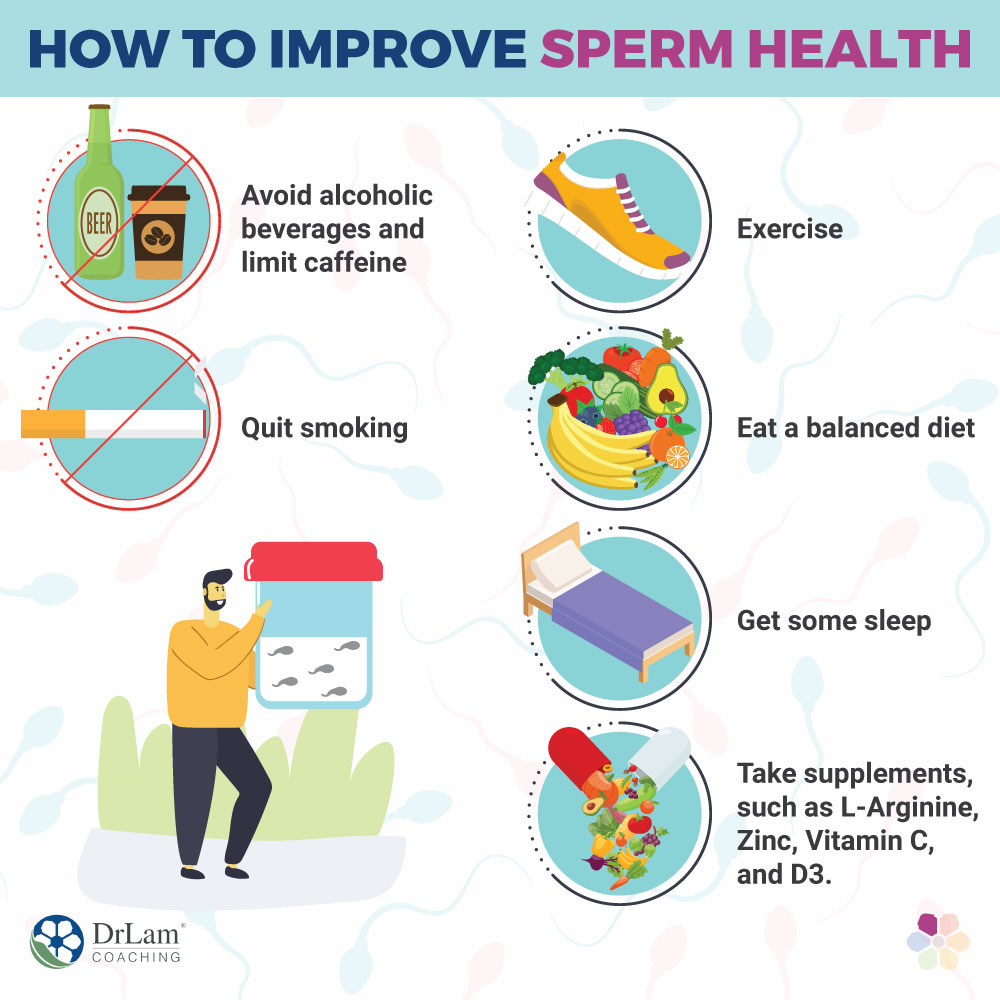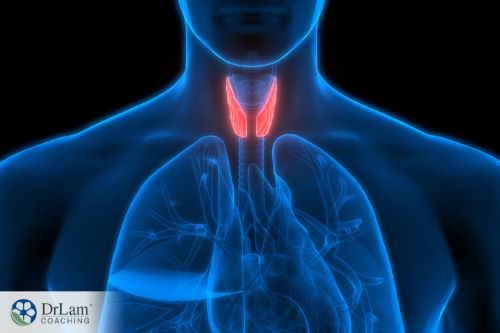 As we all know, sperm is responsible for fertilizing an egg, which leads to creating a new human being. Sperm can also be called “male seed” or “semen,” produced in the testicles. Healthy sperm is the key to a happy life and a happy, healthy family. That’s why improving your sperm health is so important. Improving your sperm cells means making changes to help your sperm become stronger. These changes can make a big difference in your love life and quality of life. Improving your sperm cells doesn’t have to be complicated or time-consuming. With the tips below, you can start taking steps today to improve your sperm cells and have a happier life.
As we all know, sperm is responsible for fertilizing an egg, which leads to creating a new human being. Sperm can also be called “male seed” or “semen,” produced in the testicles. Healthy sperm is the key to a happy life and a happy, healthy family. That’s why improving your sperm health is so important. Improving your sperm cells means making changes to help your sperm become stronger. These changes can make a big difference in your love life and quality of life. Improving your sperm cells doesn’t have to be complicated or time-consuming. With the tips below, you can start taking steps today to improve your sperm cells and have a happier life.
A sperm cell is a spermatozoon. Sperm cells are the male gametes in animals and plants; each typically produces half of the genetic material to create a new individual. A healthy male reproductive cell can fertilize a female reproductive cell, creating a unique individual.
Sperm are the male gametes in animals and plants; each typically produces half of the genetic material to create a new individual. Healthy sperm can fertilize a female reproductive cell, creating a unique individual. They are microscopic cells, but they contain several chemicals that allow them to travel through the female reproductive tract to fertilize the egg. The sperm must be able to swim through the cervix and uterus to reach the egg.
Each sperm cell has a head and a tail. They use their tails to propel themselves forward while their heads travel downward toward the egg. For doctors to assess sperm health, they can conduct a sperm cell analysis. This procedure looks at several factors: the number of healthy sperms, how large and shaped the cells are, and their motility. A doctor may use this procedure if someone struggles to get pregnant or after undergoing sterilization to check whether there's an underlying issue.
According to the World Health Organization (WHO), the following are normal ranges for healthy sperm cells in numbers between high hundreds of thousands up to millions according to age group:

Sperm is affected by many factors. Stress, smoking, alcohol abuse, and environmental toxins are common culprits. Declining sperm quality is an emerging concern among men and their partners. In addition to the problem of infertility, men are reporting issues with their ability to have healthy sexual relationships. Several different factors could cause a decline in male reproductive health.
From environmental contaminants to lifestyle choices, here are some of the factors that are affecting male reproductive health and the steps that you can take to improve it:
Several drugs can affect male fertility, including steroids (corticosteroids and anabolic steroids), cytotoxic drugs used in cancer treatments, marijuana, and opiates. Contact your healthcare provider if you are on any medications for long-term periods or have forgotten the side effects. Healthcare providers should always inform patients about their potential side effects.
There is a lot of information regarding environmental substances that might cause damage to sperm health. Prolonged radiation exposure is proven to cause congenital disabilities and damage cells. Studies show other substances thought to have a detrimental effect on sperm cells are perfumes containing phthalates, some pesticides, organic mercury, polychlorinated biphenyls, and estrogens in the water supply.
Smoking may affect the ability to reproduce in men and the health of their sperm. Sperm exposed to smoke for long periods is less active and less likely to make it into an egg or implant onto a uterus wall. They also have more genetic abnormalities than those who do not take tobacco products.
 Alcohol consumption can damage sperm cell production in a few ways. One way is that alcohol could increase estrogen production by the liver, lowering your sperm count. It can also directly poison cells that produce sperm within your testicles. Limit how much you drink when trying to improve fertility.
Alcohol consumption can damage sperm cell production in a few ways. One way is that alcohol could increase estrogen production by the liver, lowering your sperm count. It can also directly poison cells that produce sperm within your testicles. Limit how much you drink when trying to improve fertility.
Being too warm reduces fertility because it affects the testes and decreases their effectiveness in producing sperm cells. It's also known for the testes to function most effectively when slightly cooler than core body temperature.
Excessive use of hot tubs and saunas may lower your sperm count, as heat may decrease the production of sperm.
Improving sperm health can be difficult as many factors are involved. However, there are simple things you can do to improve your sperm quality. Let’s look at some of the best methods for improving your sperm cell.
One of the best things you can do for your sperm is exercise. Without good physical activity, your reproduction cells will be less than ideal. However, moderate levels of training can help you increase the count and quality of your reproductive cells. You may want to try walking outside for 20 minutes, doing pushups, or doing some yardwork-the extra hormones from the endorphins will help with your sex drive. Some studies have shown heavy cycling, or mountain climbing may be associated with decreased male reproductive cell quantity.
Exercise doesn't have to be complicated or time-consuming either. You can work out in many ways, including going on walks, playing sports, doing yoga, lifting weights, and spinning on a stationary bike. You could even choose one exercise activity each day, which would only take about 15 minutes per day.
Quitting smoking is the most important thing for your sperm cell's health. Smoking has a variety of health consequences, and in men, it can lead to fertility problems. It also reduces the amount of testosterone and sperm produced by the testicles. And it increases the number of free radicals in your body, which causes damage to cells. Smoking cigarettes also reduces blood flow to the reproductive system, leading to erectile dysfunction (ED) or reduced ejaculate volume.
It can result in low libido and delayed orgasm, making it harder for women to achieve orgasm during sex.
Alcohol can damage your sperm cells and affect how other parts of your body function. It is toxic to cells, so it makes sense that it would be harmful to reproductive cells. Drinking alcohol can lead to erectile dysfunction or lower sperm count, leading to fertility problems and making you unable to have children. It’s not just alcohol either if you drink too much coffee or eat too many processed foods, you may experience a drop in reproductive cell health.
A study published in 2017 found that drinking more than three cups of caffeinated drinks can damage the DNA in sperm cells, decreasing their count. This effect is not as strong for women with two or fewer cups a day, but it raises their risk of miscarriage if they are pregnant.
 The first and most important change you can make to improve your reproductive cell health is to eat a balanced diet. You need to get the proper nutrients in your body, including vitamins and minerals. A balanced diet will help you live a healthier lifestyle and improve your sperm cell health. If you’re wondering what foods are best for boosting sperm production, there are plenty of options.
The first and most important change you can make to improve your reproductive cell health is to eat a balanced diet. You need to get the proper nutrients in your body, including vitamins and minerals. A balanced diet will help you live a healthier lifestyle and improve your sperm cell health. If you’re wondering what foods are best for boosting sperm production, there are plenty of options.
Eggs, dairy products, green vegetables, fruit, whole grains, and lean meats are all beneficial for male reproductive cell health. They offer essential vitamins and minerals that help keep the cells healthy. Eating junk food isn’t going to help your reproductive cell health or your overall well-being. It might feel like it at first because it tastes good, but when you get back from eating chips (or whatever junk food you choose), the sugar rush is over, and you feel sluggish again.
Eating foods rich in antioxidants, such as L-carnitine and lycopene, may promote optimal sperm cell health.
One of the most simple and effective ways to improve your sperm cell is getting enough sleep. Studies have shown that lack of sleep can decrease your total sperm count, which will impact your fertility and reproduction. Lack of sleep can reduce your total sperm count, which will affect your fertility and reproduction.
You can also consider taking supplements that will help boost your sperm cells, such as L-Arginine, Zinc, Vitamin C, and D3.

Adrenal Fatigue Syndrome (AFS) is a condition that results from chronic stress. The adrenal glands produce hormones that help the body respond to stress. AFS can lead to a decrease in the production of these hormones, which can cause various symptoms, including fatigue, difficulty sleeping, and decreased libido; it can also affect sperm health. The AFS can reduce testosterone levels and sperm quality, and it can also cause erectile dysfunction.
A variety of factors can contribute to AFS, including prolonged stress, poor diet, lack of exercise, and sleep deprivation. Therefore, it is essential for men experiencing fertility problems or having difficulty getting an erection to consider whether they may have AFS.
Many changes that will improve your sperm cell health are also suitable for your other body systems. For example, a healthy diet is necessary for all body systems to function correctly. A healthy diet can help reduce stress and the effects of AFS by providing the proper nourishment to your cells. In addition to a healthy diet, adding a few supplements may also be helpful. When your sperm cell health is at its best, they have access to what they need to thrive. You must give them everything they need to work better and produce healthier sperm.
Many people don’t realize the impact of stress on their reproductive cells. That’s because a hormone called cortisol is released as a response to stress and can lower sperm production. When cortisol levels are low, many hormones in the body change, including testosterone. The lower the cortisol level is, the lower your testosterone will be.
AFS is a condition that should be treated by a medical professional. If you think you may have AFS, you should talk to your doctor.
 The Neuroendometabolic Stress Response has six circuits in the body to help you deal with stress. These systems and organs interact when handling stressors or things that disrupt your homeostasis. The Hormonal Circuit is a major one of those six. It deals with testosterone levels and other hormones, among other things, and their interaction. This circuit's other essential parts include the thyroid gland and reproductive organs like ovaries, testes, and adrenal glands.
The Neuroendometabolic Stress Response has six circuits in the body to help you deal with stress. These systems and organs interact when handling stressors or things that disrupt your homeostasis. The Hormonal Circuit is a major one of those six. It deals with testosterone levels and other hormones, among other things, and their interaction. This circuit's other essential parts include the thyroid gland and reproductive organs like ovaries, testes, and adrenal glands.
Men who produce an imbalanced amount of cortisol might experience lowered testosterone levels. The hypothalamic-pituitary-adrenal (HPA) axis and the hypothalamic-pituitary-gonadal axis are jointly responsible for testosterone production in men. Low or decreased male sex hormone levels can lower a man's libido, reduce semen production, cause anxiety or depression, lead to bone loss and muscle mass loss, and premature balding. On top of this, weight gain is also typical among low testosterone sufferers.
The hormone testosterone is responsible for developing and maintaining sperm cells. This hormone also regulates the production of sperm. Testosterone levels can influence the health of the male reproductive cells, impacting fertility. Stress triggers your body to produce more cortisol, which leads to lower production of other hormones.
When cortisol levels decrease, a hormone called pregnenolone is called on to produce cortisol. Pregnenolone also reduces the production of other hormones like testosterone. If you are trying to conceive or hoping to maintain your current level of testosterone, you may want to avoid the things that cause your pregnenolone levels to decrease.
There are several ways to increase pregnenolone levels. One way to increase pregnenolone levels is to reduce stress. Stress can cause the body to release cortisol, leading to a decrease in pregnenolone levels. There are many ways to reduce stress, including exercise, meditation, and yoga.
Evidence indicates that lifestyle may play a role in sperm health. It helps provide more reasons for men to take care of themselves and follow an overall healthy lifestyle, where you would avoid poor habits. Some interventions are as healthy and straightforward as changing what you eat, engaging in stress-reducing activities, or taking supplements to improve testosterone levels. It would be best if you took a little time every day to do what's best for your body.
Please do your best to take a course of action with the guidance of your healthcare practitioner, who will assess the supplements' benefits for you and recommend an appropriate dosage.
The team at Dr. Lam Coaching can help if you are looking for more information on adrenal fatigue syndrome and the NeuroEndoMetabolic stress response and hormonal circuit. We offer a free** no-obligation phone consultation which will discuss your symptoms privately over the phone at +1 (626) 571-1234 or through our Ask The Doctor system.
The best way to improve sperm health is to engage in physical activities and eat a diet rich in antioxidants and vitamins that enhance quality. Include foods like dark leafy greens, dark chocolate, berries, and fatty fish - all of which are high in nutrients for the body.
